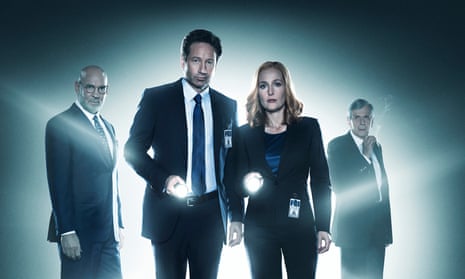Call me a conspiracy theorist, but I don’t think it’s a coincidence that The X-Files revival has come when there’s the same climate in global politics – extreme scepticism – as when it first aired.
The original series, which ran between 1993 and 2002, was conceived in 1992 – the US election year in which the TV presenter Pat Buchanan came an unnervingly close second to George HW Bush in the New Hampshire primary, and the wacky billionaire Ross Perot horrified the Republican party by running as an independent – and winning 18.9% of the vote in the most successful presidential bid of modern times by a non-politician.
Strikingly, the 2016 revival has coincided with the nearest recent equivalents to those outsider insurgents: Donald Trump and Bernie Sanders. Both men appeal to voters who believe that “the truth is out there”, rather than in Washington DC. Last night, the opening show of the six-part revival aired in the UK as the fourth part was shown by Fox in the US – on the eve of the 2016 primary votes in New Hampshire.
Even more spookily, one of the key speeches in the opening episode – which suggested that the US had been “keeping secret for 70 years” a form of free energy revealed by extraterrestrial technology – sounded like one of the anti-corporate, anti-Washington speeches that Sanders has become known for on the campaign trail. And both Trump or Sanders could have echoed Fox Mulder’s claim that “your own government lies as a matter of course, a matter of policy”.
Most politically topical, though, was Mulder’s sudden loss of faith in his belief (which sustained nine whole seasons) that aliens were trying to take over the US. Now he suspects that “everything we have been led to believe in is a lie ... there is no alien conspiracy”. Now he suspects that the unexplained happenings since the sightings at Roswell air force base in 1947 are part of a vast rightwing conspiracy.
This continues the show’s habit of using the paranormal to reflect the abnormalities of US politics. (This has never been a series for viewers who were 100% sure that John F Kennedy was shot by Lee Harvey Oswald acting alone.) The storyline also contains pointed references to the Watergate scandal, which led to the resignation of President Nixon and encouraged among Americans both a distrust of politicians and a greater belief in conspiracy theories. Nixon was seen speaking on TV in the background during the abduction of Mulder’s sister when he was a child – an event he blamed on aliens and that prompted his career as a truthseeker.
But, while the key internal coordinates were the JFK shooting and Watergate – scenes often take place in underground car parks, the favoured meeting place of the Watergate mole Deep Throat – the show owed much of its impact to the external atmosphere of post-cold war America, as dictatorships fell around the world and elected politicians struggled to find the right words for a free world.
Ending its first run in 2002, The X-Files had little time to reflect on the consequences of 9/11. But the new series specifically positions itself in a new era of governmental paranoia and public scepticism, with lines such as: “Since 9/11, the country has taken a very dangerous turn in a wrong direction.”
Other than summing up the political mood in the US, there’s little conspiracy about the main reason the series has been brought back. In an increasingly crowded cultural marketplace, producers take comfort in franchises – whether that’s Dad’s Army, Star Wars or War and Peace – with established name recognition. (It also helps that Duchovny, in Californication and Aquarius, and Anderson, through TV shows such as The Fall, have recently increased their screen popularity.)
But, although the show’s famous slogan has been updated to “The truth is still out there”, there is already doubt about how long that truth will be around. US viewing figures showed a sharp drop from 16.2 million for the opener to fewer than nine million for the third. The review-aggregator site Rotten Tomatoes gives the series a 58% approval rating and offers this critical consensus summary: “Gillian Anderson and David Duchovny’s chemistry remains intact, but, overall, The X-Files revival lacks the creative spark necessary to sustain the initial rush of nostalgia.”
The truth about its afterlife remains to be seen. But, on the evidence of the politically timely opening episode, I hope the show is still around next year when one of the candidates standing in New Hampshire – or possibly a new anti-politics insurgent – is in the White House and has found out if there really are any X-Files.

Comments (…)
Sign in or create your Guardian account to join the discussion